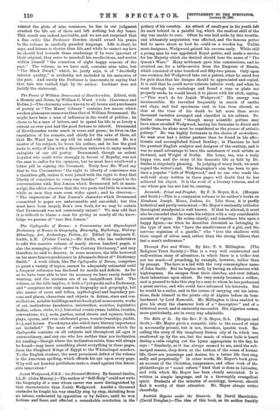Josiah Wedgwood, P.R.S. : his Personal History. By Samuel Smiles,
LL.D. (John Murray.)—The author of " Self-Help" could not write the biography of a man whose career was more distinguished by that characteristic than Josiah Wedgwood. Amidst a thousand obstacles he fought his way steadily step by step, shrinking from no labour, undaunted by opposition or by failure, until he won fortune and fame, and effected a remarkable revolution in the pottery of his country. • An attack of small-pox in his youth left its mark behind in a painful leg, which the medical skill of the day was unable to cure. Often he was laid aside by this trouble, and ultimately amputation was effected, and the famous potter had to move about as best he could on a wooden leg. unlike most designers, Wedgwood gained his success early. While still a young man he was appointed Royal potter, and made a service for her Majesty which she desired should bear the name of " The Queen's Ware." Many noblemen gave him commissions, and he received one for a table-service from the Empress of Russia, which consisted of nine hundred and fifty-two pieces. Only upon one occasion did Wedgwood take out a patent, since he cared less for gain than that his designs should be appreciated and copied. It is said that he could never tolerate inferior work, and when he went through his workshops and found a vase or plate not properly made, he would break it to pieces with his stick, saying, —`This won't do for Josiah Wedgwood." His energy was inexhaustible. He travelled frequently in search of earths and clays, and had specimens sent to him from abroad, so that at the time of his death he left more than seven thousand varieties arranged and classified in his cabinet. Dr. Smiles observes that " though many scientific potters may have since excelled Wedgwood, having his formulas to direct and guide them, he alone must be considered as the pioneer of artistic pottery." He was highly fortunate in the choice of co-workers. No man ever had a better partner than he found in his affec- tionate and accomplished friend Bentley; in Flaxman he had the greatest English sculptor and designer of the century, and it was no small advantage to have the assistance of such artists as Stothard, and Wright of Derby. His home, too, was a truly happy one, and the story of his domestic life as told by Dr. Smiles is singularly pleasing. In judging of every book, we must regard the writer's end. The biographer's aim has been to pro- duce a popular " Life of Wedgwood," and no one who reads the well-told story written in these pages will doubt that he has achieved his object. It is the work of a literary veteran, and of one whose pen has not lost its cunning.


















































 Previous page
Previous page